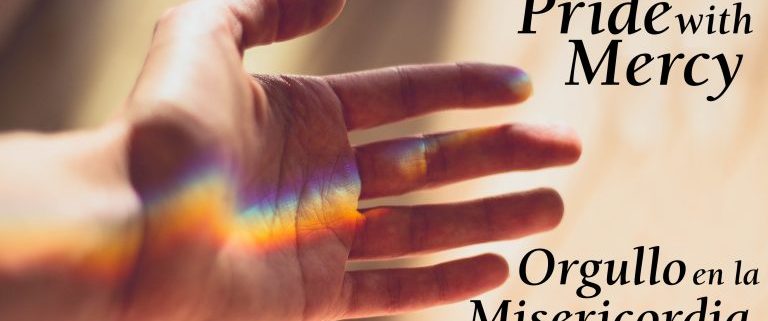On Pride and Against Prejudice
By Mary E. Hunt
Originally published for Sisters of Mercy, 25 June 2019
I asked my teenage daughter if she wanted to join me for the local Pride celebration in Washington, D.C. She had been before as a younger child and remembered it fondly for the tons of swag she got—a bright frisbee, a colorful keychain, endless candy from groups and businesses showing their support for LGBTQ+ people. But now, as a teen and more aware of the world, she was not quite clear why we needed a Pride celebration at all. What’s the big deal, she asked? Typical teen attitude, but she made me think about it as I tried to persuade her to join me.
The simple answer is that pride is a survival mechanism for dealing with prejudice. Jane Austen forgive me, but heterosexual people do not have a corner on complicated marriage choices and the right to marry for love. Yet it is only in my lifetime—born in the 1950s—that the notion of same-sex love as healthy, good, natural and holy has been conceivable.
Thanks to advances in the social and biological sciences, it is now obvious that love and responsible, mutually enjoyable sex come in many packages. Millions of people living good lives prove it. Still, same-sex love is far from accepted everywhere. Indeed, it is illegal in some places.
This year marks the fiftieth anniversary of Stonewall, the name of a Mafia-owned bar in Greenwich Village where gay, lesbian, bisexual and transgender people fought back against police who tried to arrest them for socializing. Picture the scene: burly cops cuffing drag queens; young men resisting police even knowing that their lives would be ruined by an arrest; strong, spirited women getting tossed into the paddy wagons. A growing crowd outside made clear that enough was enough, and they came back the next night and every year since to declare their pride. No longer would same-sex-loving people be bullied. On this 50th anniversary year, NYC Police Commissioner James P. O’Neill offered a heartfelt and deeply welcome apology: “The actions taken by the N.Y.P.D. were wrong—plain and simple.” I see Mercy values reflected in his humble but powerful action.

Many other factors set the LGBTQ+ movement into motion, but this iconic event symbolizes changes in attitudes and practices that are now largely considered passé in many parts of the world. Yet we know that there are still many countries where it is at best unsafe and at worst punishable by law to be a same-sex loving person. Change comes slowly and at a high price.
This year also marks the fiftieth anniversary of DignityUSA, Catholics committed to LGBTQ+ equality. Dignity’s approach is transparent and transformative:
“We believe that gay, lesbian, bisexual, transgender, queer and intersex Catholics in our diversity are members of Christ’s mystical body, numbered among the People of God. We have an inherent dignity because God created us, Christ died for us, and the Holy Spirit sanctified us in Baptism, making us temples of the Spirit, and channels through which God’s love becomes visible. Because of this, it is our right, our privilege, and our duty to live the sacramental life of the Church, so that we might become more powerful instruments of God’s love working among all people.”
Dignity will kick off its celebration in Chicago in July by hosting a meeting of the Global Network of Rainbow Catholics, with delegates expected from 30 countries and five continents. Who could have imagined that 50 years ago? Dignity’s convention theme, “True to Ourselves, True to the Spirit,” captures their Catholic history. Through lectures and liturgies, discussions and dancing, Dignity will launch its next 50 years, now part of a global Catholic movement.
It has not been an easy lift, but now that the Supreme Court has found in favor of marriage equality, living as an out LGBTQ+ person has gotten a lot easier. Put another way, because so many LGBTQ+ people and our allies live as responsible citizens with pride in ourselves despite plenty of prejudice, the Supreme Court found in favor of marriage equality. Take your pick, but our hard-won struggles are why some young people like my daughter can afford to be blasé about celebrating Pride.
I marvel at how far we have come in my lifetime. But my joy is sobered by the realization that for many people—the young, the poor, people of color, and especially trans folks—life is still unspeakably difficult. That is why efforts to educate and advocate are at the top of my to-do list. I hope and work so that my daughter and her friends can enjoy the human right of loving whom they please, and know that their love is of God.



